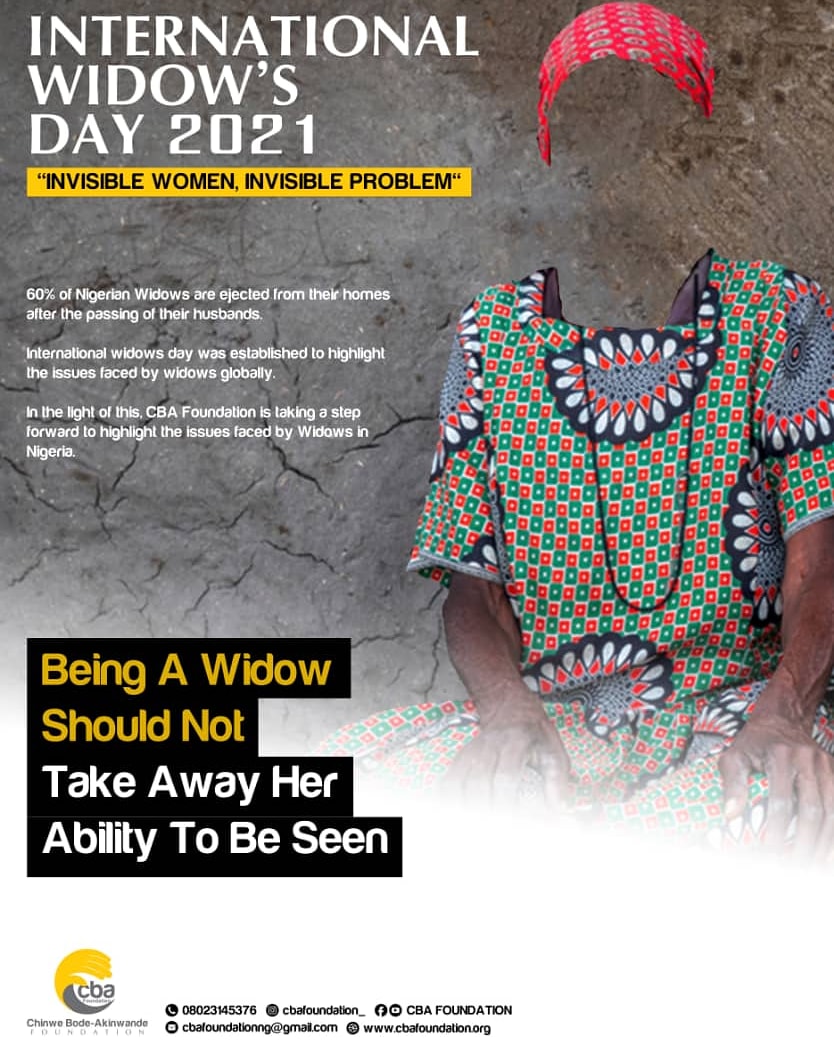By Zion Rufus
As the United Nations commemorate International Widows’ Day 2021 with the theme “Invisible Women, Invisible Problems”, the Chinwe Bode-Akinwande Foundation (CBA Foundation) has added her voice to the welfare of widows urging policy makers to make policies that favor this category of women in the country.
Led by Mrs. Chinwe Bode-Akinwande and launched in 2005, the CBA Foundation is primarily dedicated to promoting and protecting the lives and well-being of underprivileged widows and their vulnerable children in Nigeria, through health interventions, provision of clothing, nutrition, tuition fees for their children, and launching business startups for long term sustenance.
Commenting on the IWD, the Foundation announced: “International Widows’ day is important because it spreads awareness about the challenges widows face worldwide. It also helps in finding ways to support those widows as part of our social responsibilities. Being a widow should not take away her ability to be seen.”
In addition, the CBA Foundation is advocating for individuals to promote the well-being of underprivileged widows and their children.
In 2010, the United Nations declared June 23rd as International Widows Day to raise awareness of the violation of human rights that widows suffer in many countries following the death of their spouses.
According to the United Nations, there are more than 258 million widows around the world who have been left unseen, unsupported, and unmeasured in our societies. The International Widows’ Day was launched to kick against the violence and discrimination suffered by widows, develop resources to empower them, initiate policies that would eradicate superstitious allegations leveled against them, and also provide the children with access to education, work, and healthcare.
The horror of widowhood has gone beyond just the fear of lonesomeness or parting with the ‘love of your life’; the greater dismay that await women following the death of their husbands also include stigmatization, outright rejection, eviction, accusation, and being denied of inheritance and land rights, amongst other unjust actions.
In some parts of Nigeria, dreadfully, it is naturally assumed by the groom’s relative that his wife must have been responsible for his death. It is believed that ‘men do not die until their hairs are grey’. Some other tribes take this cultural belief to a further extent by forcing the widows to drink the water used to wash their husband’s corpse in a bid to exonerate themselves from the allegations made against them.
In some cases, they are required to swear their innocence before a god, shave their hairs off completely, wear black outfits, and remain unseen or isolated for a specified period. These women and their children are left in poverty, vulnerable to abuse, and neglected, with no one to support, and ultimately left at the mercy of their relationship with the man’s family.
Although in 2015, the Nigerian laws kicked against such practices, only 23 of the 36 states of the federation have formally adopted these laws; others still see it as tradition which should remain unchanged.
CBA Foundation has reached out to thousands of widows and children through skills acquisition training, health interventions, business start-ups and provision of clothing, nutrition and tuition fees for the children.






Comment
No comments found.